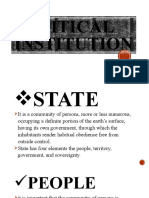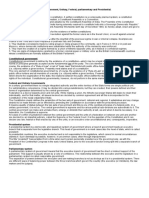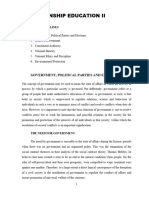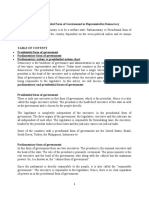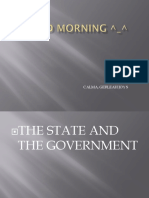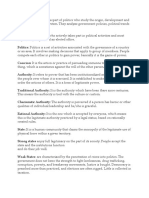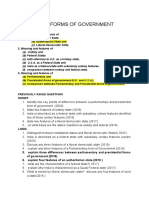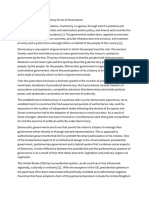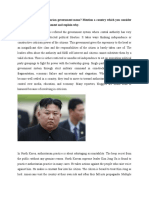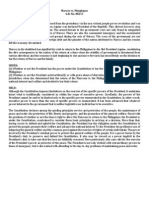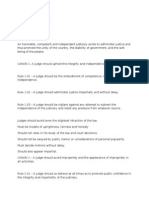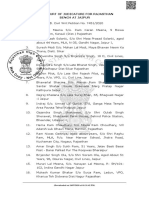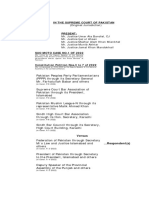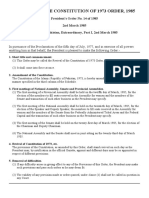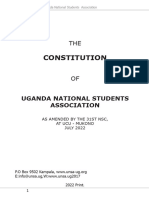Constitutional Law I
Constitutional Law I
Uploaded by
mariellepsantiagoCopyright:
Available Formats
Constitutional Law I
Constitutional Law I
Uploaded by
mariellepsantiagoOriginal Description:
Copyright
Available Formats
Share this document
Did you find this document useful?
Is this content inappropriate?
Copyright:
Available Formats
Constitutional Law I
Constitutional Law I
Uploaded by
mariellepsantiagoCopyright:
Available Formats
Constitutional Law 1
MPS
PRESIDENTIAL vs. PARLIAMENTARY GOVERNMENT The Parliamentary System advocated by some statesmen and scholars differs from the Presidential System in many important aspects: 1. The President of the Philippines as primarily the Head of the State is elected by the members of Parliament, approximately 200 members more or less, and no longer by direct vote of the people. 2. The Head of the government will be the Prime Minister chosen from among the members of Parliament. Generally, the leader of the majority party in Parliament is chosen for this position. 3. The members of the cabinet are chosen from among the members of Parliament. 4. The Prime Minister and the cabinet members have no fixed term or tenure of office. They fall from their respective positions if a majority of Parliament passes a resolution withdrawing confidence from them. 5. If the Premier and the members submit to this resolution withdrawing confidence, the government (Prime Minister and cabinet members) falls and another new government (i.e. Prime Minister and cabinet will have to be informed and voted upon the majority in Parliament). If the government (Prime Minister and cabinet) believes that its policies gave the general approval of the people, said government may appeal to the people to decide the issue. If majority of Parliament that voted down the cabinet is resumed by the people, the appealing cabinet is deemed to have been repudiated by popular vote and must vote, the Parliament majority that withdraw confidence from it is not returned to their seats. UNITARY vs. FEDERAL UNITARY SYSTEM Which revolves around a central authority, is the system used in most presidential and parliament countries today. Refers to as a top-to-bottom government since the power comes from the top and trickles down to the bottom. This central government is in fact in charge of policy making and is the ultimate the law making body in the land. In the Philippines, it delegates these tasks to subsequent provincial and local government units. The main advantage is uniformity among the different local and provincial governments. This is not without skeletons in its closet. Local government units up to the provincial government may also be ill-equipped to tackle local concerns. Since the national government deal with national problems and is responsible for budgeting sectors, it may allocate funds or bigger projects and programs, leaving the local governments to fend for themselves. FEDERAL SYSTEM Is divided into several smaller, self-governed states or regions. These states function almost like independent countries, and may even have their own set of state-specific laws same-sex marriage May be allowed in some but not in others, for example but are directly concerned with nationwide issues such as national defense or foreign policy. Those issues are handled by a central government, which acts like a governing body of the smaller, state-governing bodies. The states and the central government follow a set of rules and policies that define their relationship and what can and cannot be done by both. A federation is not without its blemishes. Because each state government has its own style of governance, citizens all over the federation will be experiencing different levels of welfare. The competencies and efficiency of each state government will also not be the same, potentially creating further disunity. A policy exercised across different states may differ in magnitude, like penalties for criminal offenses. Finally, there is always the possibility of disagreement and conflict between state and central governments over authority and power. SOVEREIGNTY Refers to the status of the Philippine nation as an Independent sovereign state. One of the essential features of the state. It is this feature which differentiates the state from other human associations and organizations.
Constitutional Law 1
MPS
LEGAL SOVEREIGNTY vs. POLITICAL SOVEREIGNTY Legal Sovereignty Represents the lawyer's conception of sovereignty. It is associated with the supreme law-making authority in the state. The body which has the power to issue final commands in the form of laws is the legal sovereign in a state. This power may be vested in one person or a body of persons. It may be a king or dictator or parliament. Under absolute monarchies, it was the king who was vested with the power of making laws. Is defined as that person or body of persons that makes law and whose law is final and is recognized by courts and is enforced by the executive. It is the power of the state to issue final commands. This power is vested to those who we gave authority to decide for us. Example is the President or the Congress. Characteristics: 1. A legal sovereign is definite and determinate. It may be a person as in the case of an absolute monarchy or a body of persons as in the case of the British Parliament. 2. Legal sovereignty is definitely organized and re-organized by constitutional law. 3. Legal sovereign alone has the power to declare in legal terms the will of the state. Political Sovereignty The concept of political and popular sovereign is very confusing. In the modern democratic state, a distinction, all the same, has come to stay between legal sovereign and political sovereign. Is the all the influences behind the legal sovereignty. Since we are the ones who gave them the authority to decide, we, the electorate (or the voters) are considered as the political sovereignty. INTERNAL vs. EXTERNAL Internal Sovereignty Is supreme over all citizens, aliens, associations and organizations. Its law is final and binding. All have to obey it. If it is disobeyed! It is followed by physical penalties. Legally, the sovereign is not subject to any restrictions except those provided in the constitution itself. Within its constitutional authority, there is no higher power to restrain the sovereign. It is the power of the State in controlling its domestic or internal affairs without having to rely on external or outside help or without intervention from outside forces like other states & international organizations. The power of the state to decide on its own. External Sovereignty It is free and independent, equal to other sovereigns. A state is master of its destiny and decides about peace and war. It sends and receives diplomatic agents, enters in contracts, treaties and participates in international conferences on an equal footing with other states irrespective of its size, population or power. Is the capacity of the state tolerating itself with other states in pursuing its interests. However, this does not mean that the state we have an agreement with can dictate us on what we need to do. External sovereignty means that we have the capacity to Decide on how we need to relate with other states.
You might also like
- Functions of GovernmentDocument4 pagesFunctions of GovernmentFeyre Luna100% (1)
- Types of ConstitutionDocument1 pageTypes of ConstitutionSachin Patel83% (6)
- Constitution of Pakistan Meo IttihadDocument31 pagesConstitution of Pakistan Meo IttihadMeo BhaiNo ratings yet
- Topic 7 Political InstitutionDocument20 pagesTopic 7 Political InstitutionKarl Christian BorinagaNo ratings yet
- Pad305 Elements of Government Summary 08024665051Document43 pagesPad305 Elements of Government Summary 08024665051emmanuel okorieNo ratings yet
- Group Governs Community Unit Sets Administers Public Policy Exercises Executive Sovereign Power Customs Institutions LawsDocument5 pagesGroup Governs Community Unit Sets Administers Public Policy Exercises Executive Sovereign Power Customs Institutions LawsAngeline LimpiadaNo ratings yet
- GovernmentDocument5 pagesGovernmentDaniele Katrina PimentelNo ratings yet
- The Political System of The PhilippinesDocument3 pagesThe Political System of The PhilippinesJohn Vincent De JesusNo ratings yet
- Pos 102 NotesDocument8 pagesPos 102 Notesvictorstephen881No ratings yet
- 1.constitution and Constitutional Government, Unitary, Federal, Parliamentary and Presidential. ConstitutionDocument8 pages1.constitution and Constitutional Government, Unitary, Federal, Parliamentary and Presidential. Constitutionmani jainNo ratings yet
- Describe 2 Characteristic of Federal SystemDocument9 pagesDescribe 2 Characteristic of Federal SystemRidawati LimpuNo ratings yet
- History Project STD10 IcseDocument10 pagesHistory Project STD10 IcseHem Lal100% (7)
- Philippine Politics and GovernanceDocument21 pagesPhilippine Politics and GovernancePinkFab29100% (5)
- Citizenship Education IiDocument30 pagesCitizenship Education IiShedrachNo ratings yet
- Sovereignty Main PointsDocument3 pagesSovereignty Main PointsMuzafar SoomroNo ratings yet
- Pros and Cons of Federalism in The Philippines What Are Advantages of Federal Form of Government and Why Is It Attractive To Filipinos?Document4 pagesPros and Cons of Federalism in The Philippines What Are Advantages of Federal Form of Government and Why Is It Attractive To Filipinos?josephine cruzNo ratings yet
- Philippine Government New Constitution With Human RightsDocument34 pagesPhilippine Government New Constitution With Human RightsLeizel Joy Cacal-Nonan SudarioNo ratings yet
- Government: Week Three DR Abeeda QureshiDocument29 pagesGovernment: Week Three DR Abeeda QureshiAlina ZahidNo ratings yet
- THE Philippine Governmen T: Teacher: Rodrigo D. Quinto JRDocument20 pagesTHE Philippine Governmen T: Teacher: Rodrigo D. Quinto JRPaul Marty SandigNo ratings yet
- Do You Think Filipinos Are Law-Abiding? Explain Your AnswerDocument4 pagesDo You Think Filipinos Are Law-Abiding? Explain Your AnswerNina Rotzen OcampoNo ratings yet
- Unit - IIIDocument15 pagesUnit - IIIPiyush ChaturvediNo ratings yet
- Comparative Government and Polotics 2Document3 pagesComparative Government and Polotics 2leoleicristinorNo ratings yet
- Pakistan Political SystemDocument9 pagesPakistan Political SystemGhana AshrafNo ratings yet
- Par An D PresDocument10 pagesPar An D PresPankaj SharmaNo ratings yet
- Types and Systems of GovernmentDocument40 pagesTypes and Systems of GovernmentKazumaChibaNo ratings yet
- Module 7 - Theory of Separation of PowersDocument24 pagesModule 7 - Theory of Separation of PowersChristian GeromianoNo ratings yet
- Government Test 1Document17 pagesGovernment Test 1savageread175No ratings yet
- Classification of ConstitutionsDocument14 pagesClassification of Constitutionsgeorgessenfuma813No ratings yet
- Unit 1Document4 pagesUnit 1Riya GargNo ratings yet
- Sample Forms of GovernmentDocument45 pagesSample Forms of GovernmentArgie Omaga HuindaNo ratings yet
- Unit5masterytake2 1Document3 pagesUnit5masterytake2 1api-295725781No ratings yet
- Majorship ReviewerDocument4 pagesMajorship ReviewerAira JaeNo ratings yet
- CIVICS G12 - U1 - Building A Democratic SystemDocument12 pagesCIVICS G12 - U1 - Building A Democratic Systemfatra s.No ratings yet
- Political Science FinalDocument13 pagesPolitical Science FinalSaqlain HyderNo ratings yet
- Authority and PowerDocument211 pagesAuthority and PowerKaleab Solomon100% (1)
- State and GovernmentDocument13 pagesState and GovernmentGaurav Tripathi100% (1)
- Report G&SDocument24 pagesReport G&SJubred Ada PeñanoNo ratings yet
- PC Day 1Document4 pagesPC Day 1Ruffa Mae PortugalNo ratings yet
- Imaan - SJ DefinitionsDocument6 pagesImaan - SJ DefinitionsImaan SJNo ratings yet
- The Forms of The StateDocument5 pagesThe Forms of The StatezaiyankhanNo ratings yet
- Readings in The Philippine History - Lesson 7Document6 pagesReadings in The Philippine History - Lesson 7Aizen LozadaNo ratings yet
- Forms of GovernmentsDocument1 pageForms of GovernmentsusatonibgNo ratings yet
- Lesson 5 - State FormationDocument56 pagesLesson 5 - State Formationdang khoiNo ratings yet
- COMPARATIVE LAW NotesDocument157 pagesCOMPARATIVE LAW Notessruthisekhar05No ratings yet
- LAW ReviewerDocument13 pagesLAW ReviewerMontecer, Donnalyn S. BSE SOCIAL STUDIES 2ENo ratings yet
- Constitutional Law PT 2Document6 pagesConstitutional Law PT 2Mayandha henryNo ratings yet
- Social Justice IssuesDocument9 pagesSocial Justice IssuesJerome RodejoNo ratings yet
- Federalism in DefinitionDocument3 pagesFederalism in DefinitionVMembreve HazelNo ratings yet
- Forms of GovDocument17 pagesForms of GovYoganjana SinghNo ratings yet
- Civic Education - SS3WPS OfficeDocument6 pagesCivic Education - SS3WPS OfficeFantomNo ratings yet
- American Gov. Final Exam and Essay GuideDocument6 pagesAmerican Gov. Final Exam and Essay GuideiamsmoothNo ratings yet
- Constitucional Final ApuntesDocument27 pagesConstitucional Final ApuntescrisNo ratings yet
- Presidential and Parliamentary Forms of GovernanceDocument10 pagesPresidential and Parliamentary Forms of GovernanceUmesha ThilakarathneNo ratings yet
- Name: Md. Mashfiq Rizvee ID: 1811173042: Section 1Document3 pagesName: Md. Mashfiq Rizvee ID: 1811173042: Section 1Md. Mashfiq Rizvee 1811173642No ratings yet
- POLITICAL SCIENCE PresidentialDocument16 pagesPOLITICAL SCIENCE PresidentialMAYANK GUPTANo ratings yet
- What Does The Authoritarian Government Mean? Mention A Country Which You Consider As An Authoritarian Government and Explain WhyDocument10 pagesWhat Does The Authoritarian Government Mean? Mention A Country Which You Consider As An Authoritarian Government and Explain WhyRagib Yeasar AkhourNo ratings yet
- Republic The Republican Form Of: GovernmentDocument9 pagesRepublic The Republican Form Of: GovernmentGarsha HaleNo ratings yet
- Citizenship and Bill of RightsDocument20 pagesCitizenship and Bill of RightsYangmei Angela TurarayNo ratings yet
- Citizeship Paret 2-1Document10 pagesCitizeship Paret 2-1Bililign GeremewNo ratings yet
- SSCI 101 LectureDocument76 pagesSSCI 101 LectureShein GomezNo ratings yet
- Cangco Vs Manila Railroad Co (GR 12191, 14 October 1918)Document57 pagesCangco Vs Manila Railroad Co (GR 12191, 14 October 1918)mariellepsantiagoNo ratings yet
- Anti-Graft and Corrupt Practices ActDocument6 pagesAnti-Graft and Corrupt Practices ActmariellepsantiagoNo ratings yet
- Executive Department CasesDocument4 pagesExecutive Department CasesmariellepsantiagoNo ratings yet
- Code of Judicial ConductDocument14 pagesCode of Judicial ConductmariellepsantiagoNo ratings yet
- Statutory ConstructionDocument13 pagesStatutory Constructionmariellepsantiago100% (1)
- A Comparitive Study of Presidential and Parliamentary SystemDocument21 pagesA Comparitive Study of Presidential and Parliamentary SystemAbhishek TiwariNo ratings yet
- Rights of Women and MinoritiesDocument33 pagesRights of Women and Minoritiesesakhan7444No ratings yet
- Rajasthan High Court Order On MLAs DisqualificationDocument32 pagesRajasthan High Court Order On MLAs DisqualificationThe Wire67% (3)
- SC's Detailed Judgement Explaining Reasons Behind Decision To Set Aside Qasim Suri's Controversial RulingDocument111 pagesSC's Detailed Judgement Explaining Reasons Behind Decision To Set Aside Qasim Suri's Controversial RulingDawndotcom100% (1)
- Cyrus Mistry Case StudyDocument3 pagesCyrus Mistry Case StudyIts MeNo ratings yet
- UPSC 2020 Topic - Indus Valley Civilization - 100 Must-Know Facts - UPSC GS-IDocument25 pagesUPSC 2020 Topic - Indus Valley Civilization - 100 Must-Know Facts - UPSC GS-IRituraj ThakurNo ratings yet
- A. 3. The Union Executive The Prime Minister The Union Cabinet and The Council of MinistersDocument11 pagesA. 3. The Union Executive The Prime Minister The Union Cabinet and The Council of Ministersslhsstudents10No ratings yet
- Chapter 3 To 5 PDFDocument391 pagesChapter 3 To 5 PDFfarhana_khan_LimaNo ratings yet
- Revival of The Constitution of 1973 Order 1985Document21 pagesRevival of The Constitution of 1973 Order 1985Mehmood Abdul RazzaqueNo ratings yet
- Types of Majorities in The Indian Parliament - Indian PolityDocument3 pagesTypes of Majorities in The Indian Parliament - Indian PolityPraveen KumarNo ratings yet
- Amended UNSA Constitution 2022Document28 pagesAmended UNSA Constitution 2022robinahlagum49No ratings yet
- BITS Goa ConstitutionDocument68 pagesBITS Goa ConstitutionSumit K YadavNo ratings yet
- Parliamentary VS Presidential Form of GovernmentDocument16 pagesParliamentary VS Presidential Form of Governmentabhi malik100% (1)
- 10 Icse Civics CH1 Notes.1620012983Document19 pages10 Icse Civics CH1 Notes.1620012983Prashant PandeyNo ratings yet
- State Legislature - Article 168 - 212: Bicameral and Unicameral StatesDocument5 pagesState Legislature - Article 168 - 212: Bicameral and Unicameral StatesKirti KanaujiyaNo ratings yet
- Constitution of India, Law & Engineering: Assistant Professor Kiet School of ManagementDocument90 pagesConstitution of India, Law & Engineering: Assistant Professor Kiet School of ManagementAASTHA KIETNo ratings yet
- Constitution of Japan 1946Document22 pagesConstitution of Japan 1946WJ KNo ratings yet
- De Thi Thu THPT Quoc Gia 2022 Mon Anh Lan 2 So GD DT Ha TinhDocument40 pagesDe Thi Thu THPT Quoc Gia 2022 Mon Anh Lan 2 So GD DT Ha TinhTuan Son NguyenNo ratings yet
- The Indian Parliament EngDocument100 pagesThe Indian Parliament EngDev choudharyNo ratings yet
- P L D 1993 Supreme Court 473 (Nawaz Sharif Vs Presidient of PakistanDocument435 pagesP L D 1993 Supreme Court 473 (Nawaz Sharif Vs Presidient of PakistanShafeyAliKhanNo ratings yet
- A. 1. The Union ParliamentDocument20 pagesA. 1. The Union Parliamentslhsstudents10No ratings yet
- Constitutional Law AssignmentsDocument6 pagesConstitutional Law AssignmentsMujeeb Ur Rehman MarwatNo ratings yet
- Parliamentary or Presidential SystemDocument11 pagesParliamentary or Presidential Systemsaaliny13No ratings yet
- Constitutional Law Ebook & Lecture Notes PDF Download (Studynama - Com - India's Biggest Website For Law Study Material Downloads)Document28 pagesConstitutional Law Ebook & Lecture Notes PDF Download (Studynama - Com - India's Biggest Website For Law Study Material Downloads)Vinnie Singh67% (6)
- St. Xavier's Collegiate School, KolkataDocument5 pagesSt. Xavier's Collegiate School, KolkataDhruv BajesariaNo ratings yet
- 21st Amendment 2015Document45 pages21st Amendment 2015Adnan AkramNo ratings yet
- SBI PO Prelims Memory Based Question Paper 2018: Reasoning AbilityDocument31 pagesSBI PO Prelims Memory Based Question Paper 2018: Reasoning AbilitySrikanth HunterNo ratings yet
- Coi Module 4 PPT 1Document13 pagesCoi Module 4 PPT 1rain MCNo ratings yet



